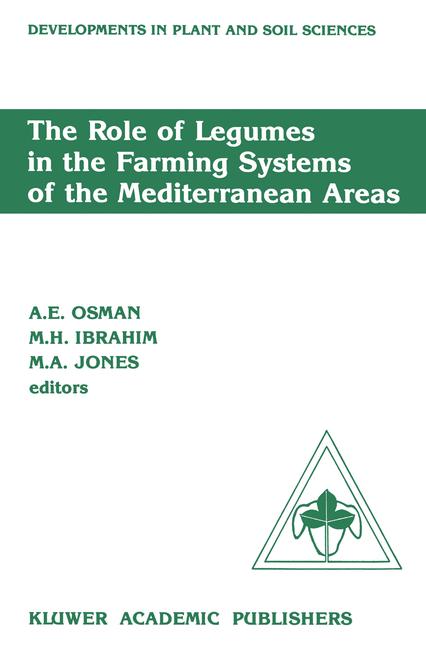(To see other currencies, click on price)
MORE ABOUT THIS BOOK
Main description:
Legumes are an important source of protein for humans and animals. They provide nutritionally rich crop residues for animal feed, and playa key role in maintaining the productivity of soils particularly through biological nitro gen fixation. They are, therefore, of immense value in rainfed farming systems. The International Center for Agricultural Research in the Dry Areas (ICARDA) has a responsibility for research on food, pasture, and forage legumes. The Center also has the broad objective of improving livestock production in rainfed farming systems. Although food legumes have be~n known and grown by farmers in the WANA region for a long time, their productivity has remained low and variable. Forage legumes, on the other hand, are not so well known by farmers of the region, and their role in the farming systems is not so well understood. Thus, we need to develop the concept of using forage legumes as crops and to fit them into cropping systems. In its efforts to increase the productivity of food legumes and develop the legume-based crop/livestock systems, ICARDA has established a network of scientists in the different National Agricultural Research Systems in the region. To further strengthen this network, ICARDA convened a workshop on 'The Role of Legumes in the Farming Systems of Mediterranean Areas' in Tunis, Tunisia, 20-24 June 1988. This workshop was co-sponsored by UNDP, who also contributed funds for this publication.
Contents:
I. A Global and Regional Overview of the Role of Legumes in Farming Systems.- Legumes in Farming Systems in Mediterranean Climates.- The role of legumes in the farming systems of Algeria.- The role of legumes in the farming systems of Cyprus.- The role of legumes in the farming systems of Egypt.- The role of legumes in the farming systems of Greece.- The role of legumes in the farming systems of Iraq.- The role of legumes in the farming systems of Jordan.- The role of legumes in the farming systems of Morocco.- The role of legumes in the farming systems of Portugal.- The role of legumes in the farming systems of Syria.- The role of legumes in the farming systems of Tunisia.- The role of legumes in the farming systems of Turkey.- II. The Role of Legumes in Human and Animal Nutrition.- The role of food legumes in the diets of the populations of Mediterranean areas and associated nutritional factors.- The role of food legume straw and stubble in feeding livestock.- III. The Role of Legumes in Crop-Livestock Systems.- Farming systems producing livestock in Mediterranean areas.- The French Mediterranean zones: sheep rearing systems and the present and potential role of pasture legumes.- The role of forage legumes in rotation with cereals in Mediterranean areas.- The role of legumes in improving marginal lands.- The role of self-regenerating pasture in rotation with cereals in Mediterranean areas.- IV. The Role of Socio-Economics and Extension in Promoting Legumes in Farming Systems.- Annual cropping under dryland conditions in Turkey: a case study.- The extension of the ley farming system in South Australia: a case study.- The use of on-farm research as a method of extending legume production in Mediterranean farming systems.- Human constraints in extending the use of forage legumes in Mediterranean areas.- V. Workshop Discussions and Recommendations.- >List of Participants.
PRODUCT DETAILS
Publisher: Springer
Publication date: October, 2011
Pages: 324
Weight: 498g
Availability: Available
Subcategories: Biochemistry
From the same series








